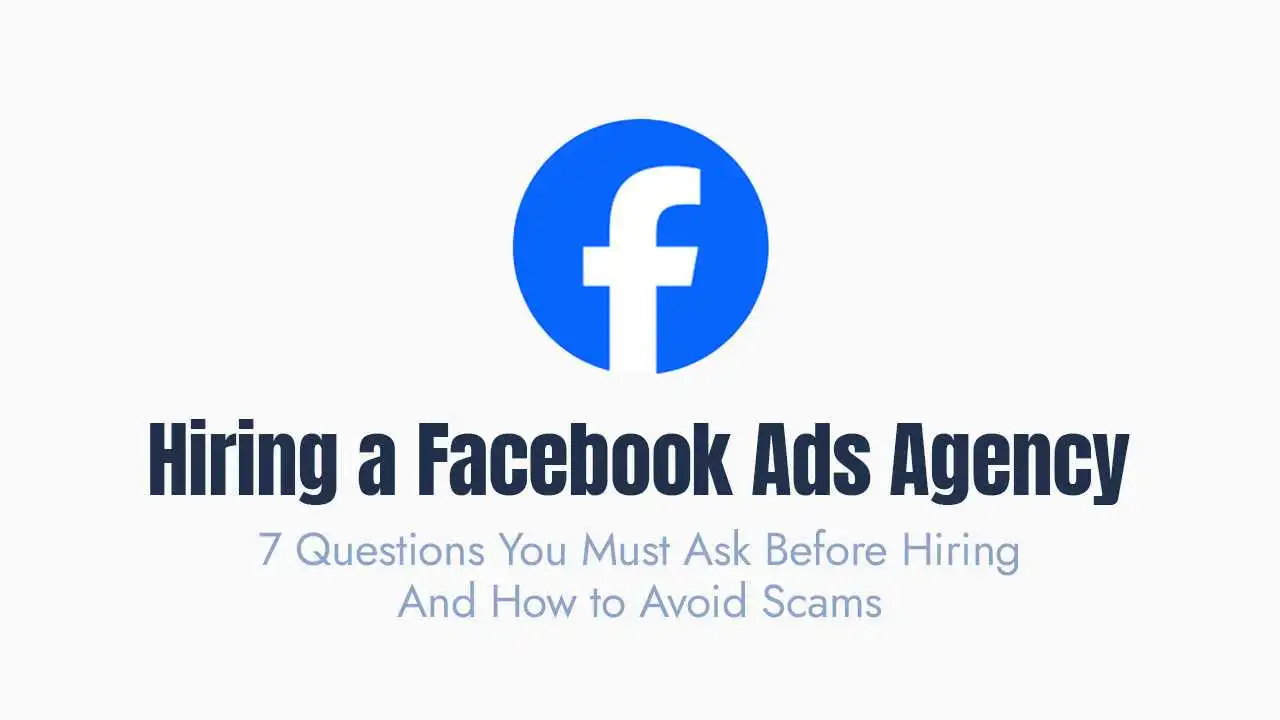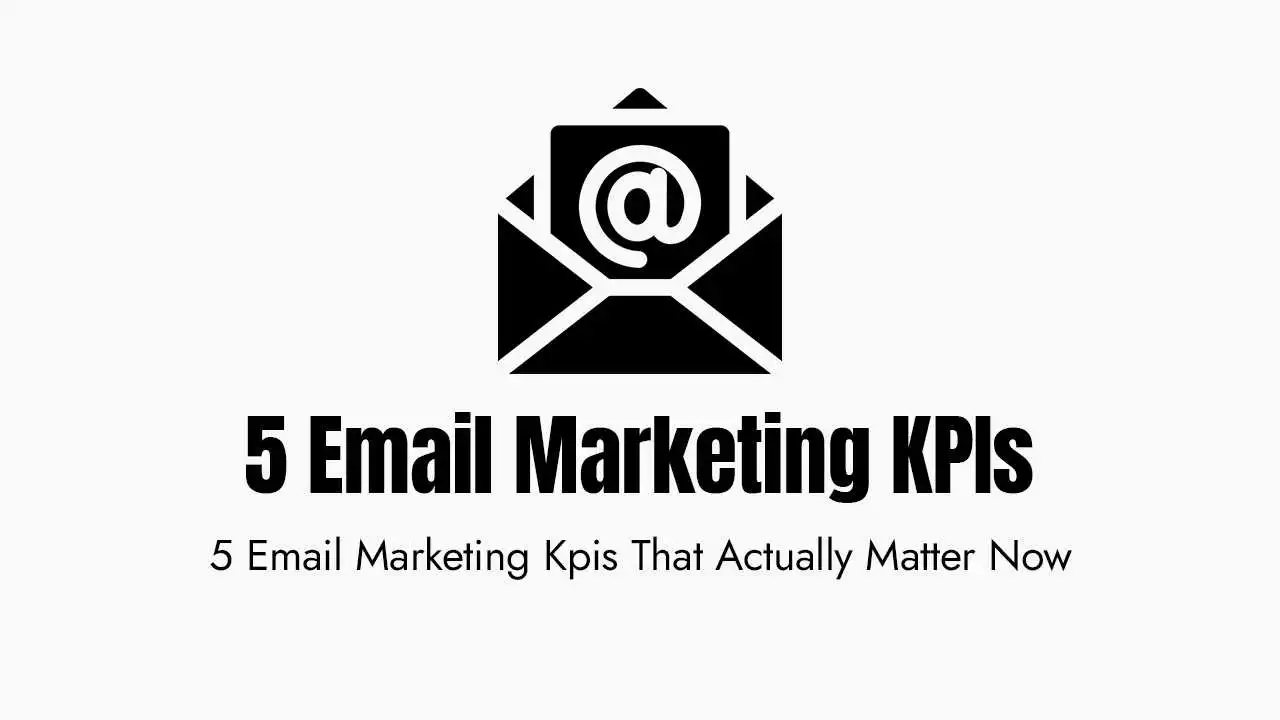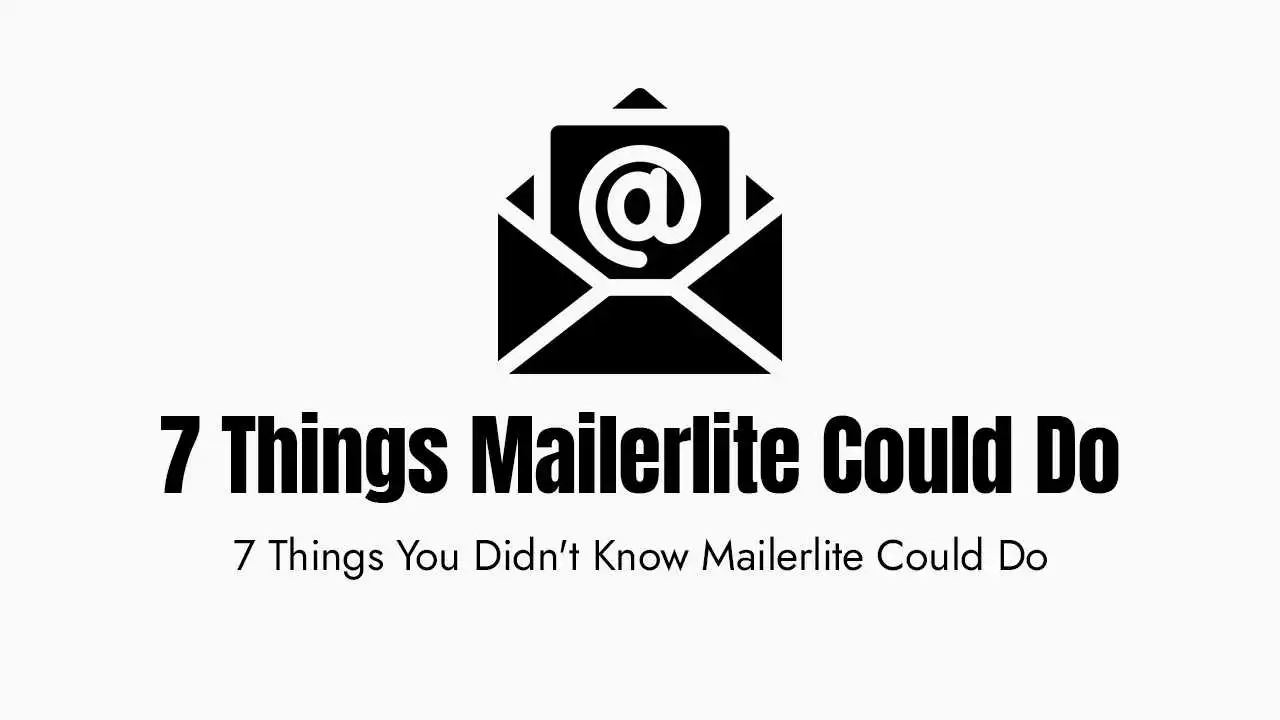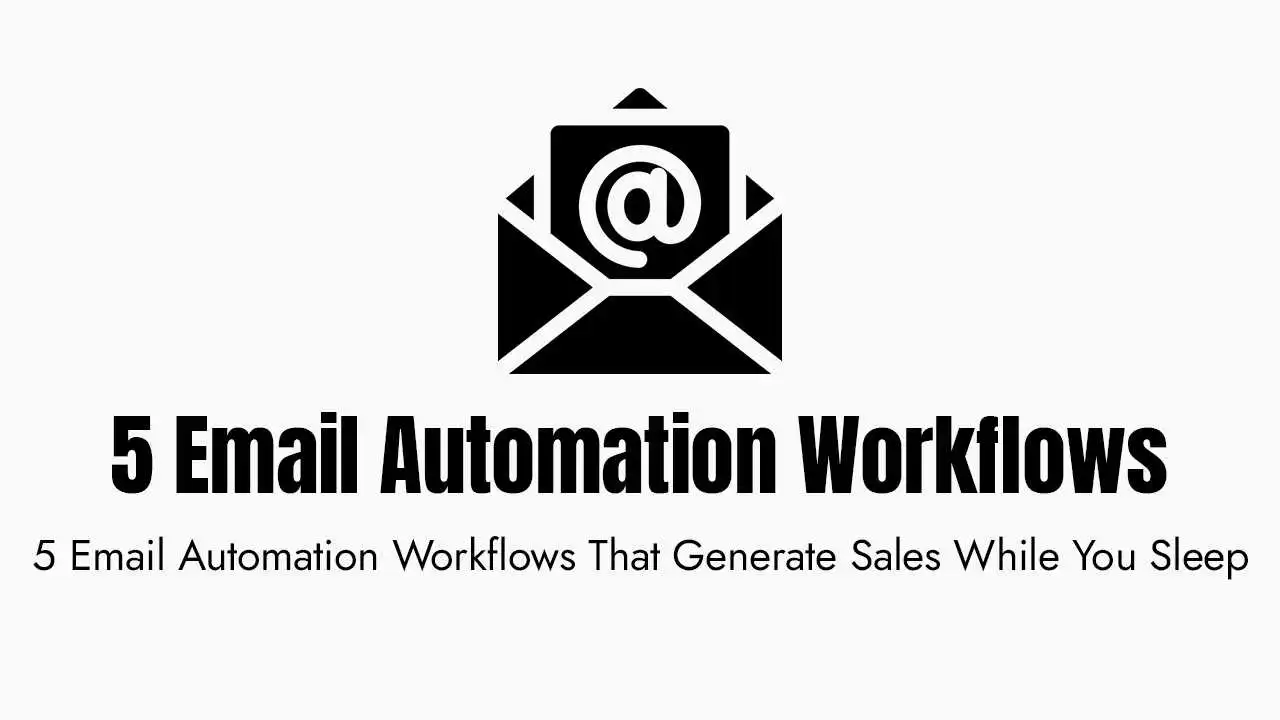Finding a reliable and high-performing Meta/Facebook Ads agency can feel like navigating a minefield. You’ve likely heard the horror stories: promises of 10x ROAS (Return on Ad Spend) that turn into wasted budgets, generalists who treat your account like a training ground, and technical tracking nightmares that leave you blind.
The platform is constantly changing. One day, a strategy works perfectly; the next, an iOS update or algorithm shift renders it useless. This is why hiring the right partner is critical.
The good news? You don’t need a crystal ball to find a top-tier agency. You just need to ask the right questions. The seven questions below are designed to be your ultimate filter. They will instantly separate ethical, high-performing specialists from generic agencies and potential scammers.
We believe in total transparency—our own Meta Ads agency operates on these exact principles. We designed our entire process to answer these questions upfront so you can focus on scaling, not vetting.
Here are the 7 essential questions you must ask before handing over your advertising budget.
The 7 Essential Questions:
The great news is that in digital marketing, generating leads doesn’t require a massive budget. Here are some beginner-friendly strategies you can implement right away:
The Specialization Test:
What percentage of your business is solely dedicated to Meta/Facebook Ads, and do you specialize in my industry (e.g., e-commerce)?
Why Ask (The Risk):
Agencies that split their time between five different platforms (Google, TikTok, SEO, email, etc.) are generalists. Their knowledge will be spread thin, and they won’t be able to keep up with the daily, sometimes hourly, changes on the Meta platform. You need a dedicated specialist.
The Good Answer:
A high percentage (70% or more) and concrete, verifiable experience in your niche. “We only focus on high-ticket e-commerce and lead generation for service-based businesses. Our team is in the Ads Manager every single day.”
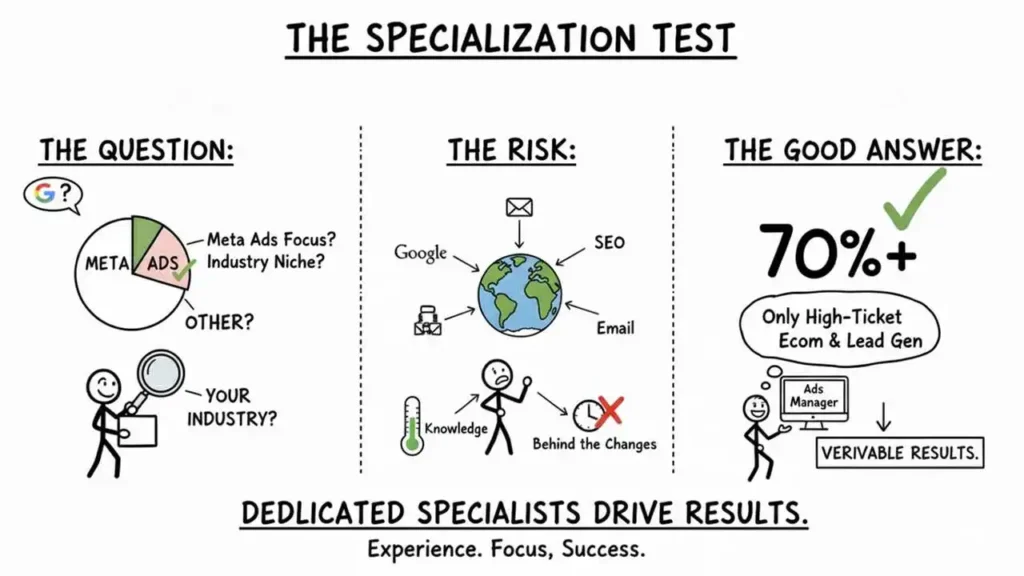
The Proof of Performance Test:
Can I see a case study with verifiable metrics from a client spending a similar budget to mine?
Why Ask (The Risk):
Anyone can grab a screenshot of a high ROAS number. What matters is context. Did they spend $1,000 to get that result, or $100,000? Insist on seeing the full picture: starting budget, end result after 90 days, and the strategy they used to get there.
The Good Answer:
Clear, detailed case studies showing before/after metrics (ROAS, CPA, AOV), specifically detailing the strategy (e.g., “We shifted 60% of the budget to UGC video ads and implemented a tiered retargeting funnel”).
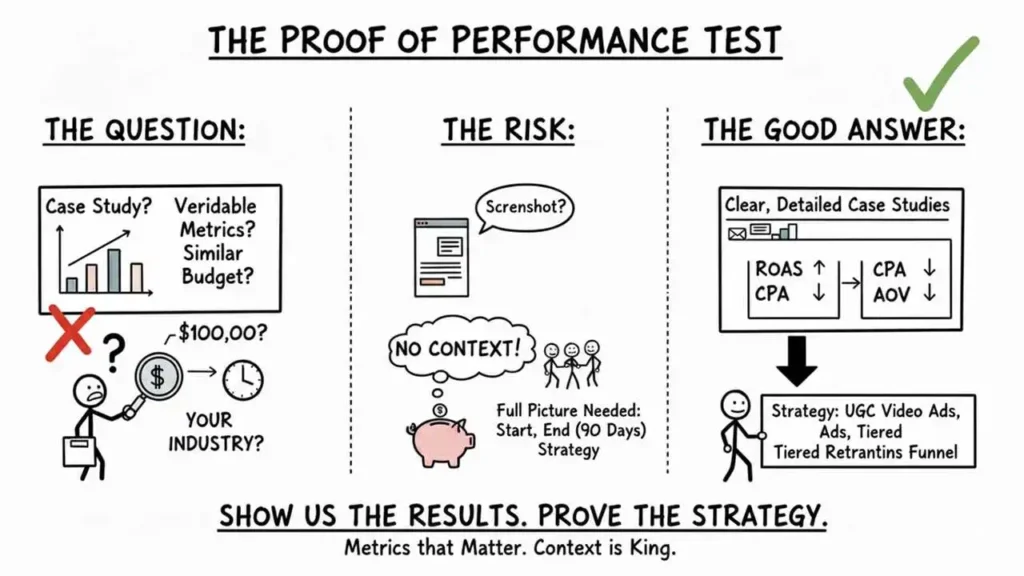
The Ownership & Tracking Test:
Will you run ads on my ad account, and how do you ensure 100% accurate server-side tracking (Conversions API)?
Why Ask (The Risk):
Agencies that insist on running your ads through their Business Manager are a major red flag—they hold your data, pixel history, and audience history hostage if you ever leave. Furthermore, post-iOS 14 performance relies entirely on accurate server-side tracking (Conversions API, or CAPI). If they don’t have a confident, technical answer here, your data will be inaccurate.
The Good Answer:
“We always run ads from your account to build your business’s asset history. Our standard onboarding includes a full, custom Conversions API (CAPI) setup via a dedicated server or integration partner to guarantee data quality.”
The Team & Accountability Test:
Who is the lead strategist, and how often will I communicate with them (not just an account manager)?
Why Ask (The Risk):
This avoids the common “bait-and-switch.” You are sold on the agency by the expert (the founder or lead strategist), but once you sign, you’re handed off to a junior employee. You need direct access to the person making the critical decisions on your budget.
The Good Answer:
Naming the strategist (e.g., “The lead strategist on your account will be Jane Doe”) and clearly defining communication: “You’ll have a weekly 30-minute strategy call, and Jane will be the primary point of contact for all strategic discussions.”
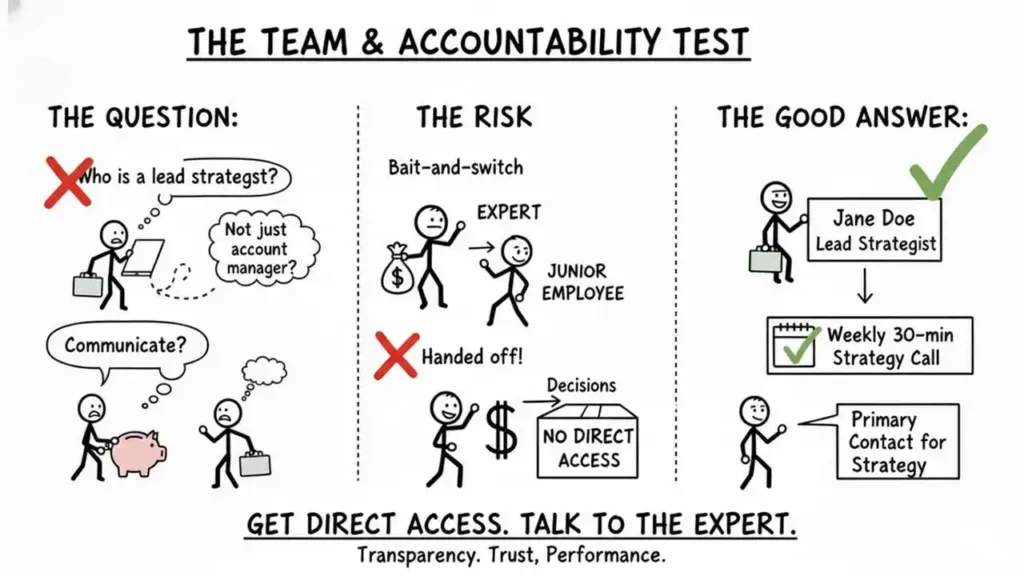
The Optimization Process Test:
Describe your 90-day testing and optimization process for creative, audience, and ad copy.
Why Ask (The Risk):
A great agency doesn’t rely on luck; they have a repeatable, systematic process. If they give you a vague answer like “we just test stuff,” they lack the technical depth required to scale. This question tests their actual methodology.
The Good Answer:
A clear, step-by-step methodology, focusing on rapid A/B testing, scaling winning ad sets, and dynamic creative optimization. “We allocate 20% of the budget strictly to testing new hooks, copy, and visuals in our ‘Creative Lab’ ad set. Winning creative moves into a dedicated scaling ad set every 14 days, following our 3-stage funnel framework.”
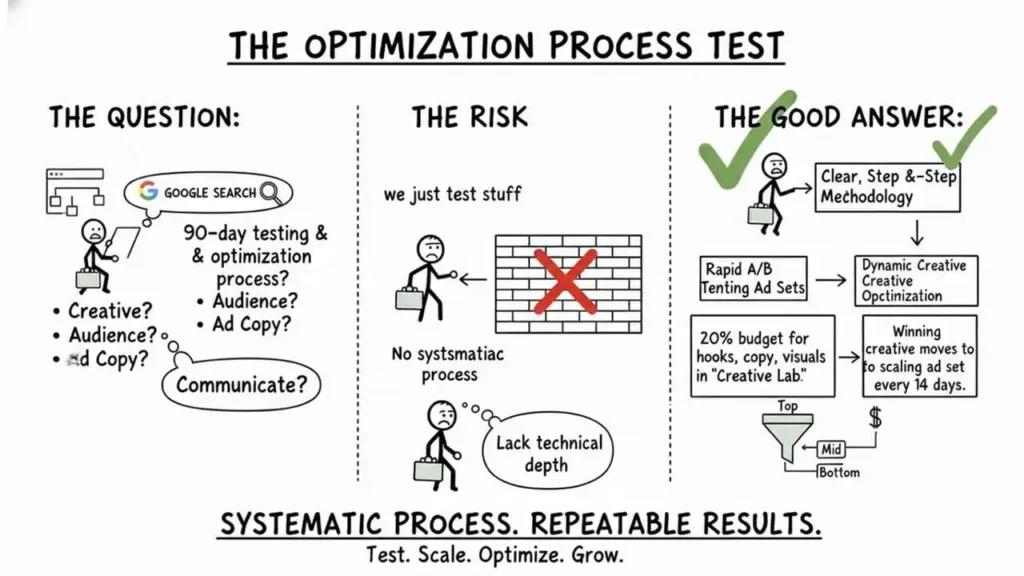
The Pricing and Commitment Test:
How is your fee structured (flat fee vs. percentage), and what is the minimum contract duration?
Why Ask (The Risk):
Agencies that require multi-year contracts lack confidence in their ability to deliver results quickly. Furthermore, agencies charging a huge percentage of a small budget can be too expensive, and those charging a low flat fee might not be spending enough time on your account.
The Good Answer:
A transparent fee model (e.g., flat fee for lower budgets, percentage for scaling budgets above a certain threshold) and a reasonable initial commitment (e.g., “We require a 3-month initial commitment for setup and testing, then move to a month-to-month agreement”).
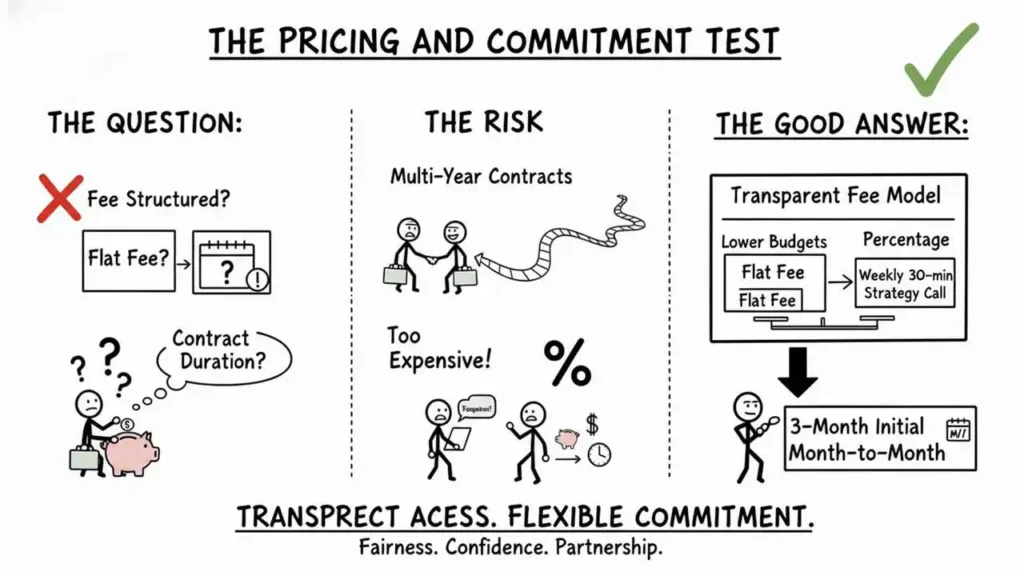
The Metric & Reporting Test:
Beyond clicks and impressions, what is the single most important metric you report on, and how often?
Why Ask (The Risk):
Scammers and low-level agencies report on “vanity metrics” like clicks (CTR) or CPM (cost per mille) because they are easy to look good. High-performance agencies focus on profit metrics linked directly to your bottom line.
The Good Answer:
Focus on ROAS (Return on Ad Spend) or CPA (Cost Per Acquisition), reported weekly and linked directly to the client’s overall business goals. “Our North Star metric is ROAS, as it ties directly to your revenue. We report a comprehensive dashboard to you every Monday and hold a strategy review call on Thursdays.”
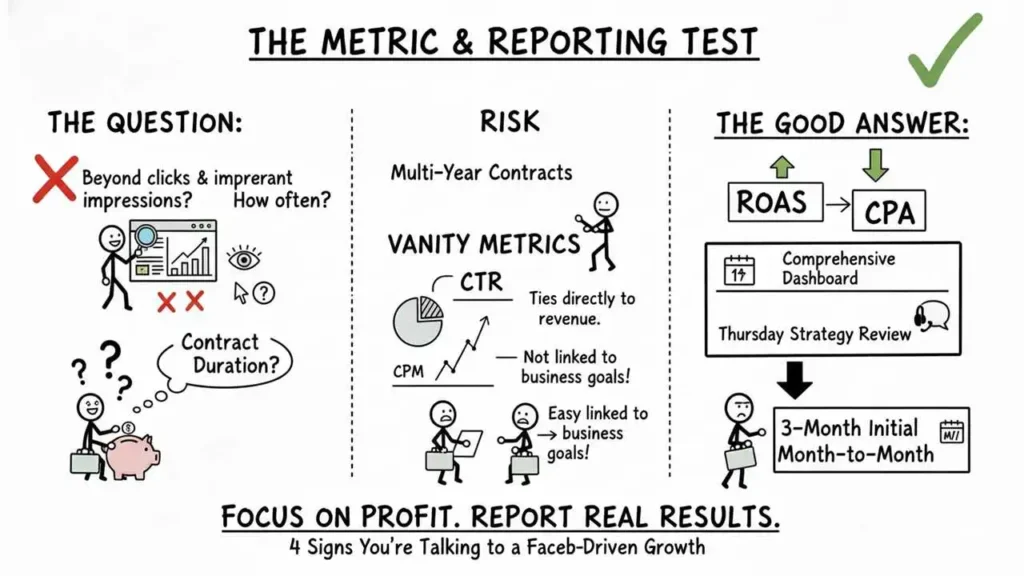
4 Signs You’re Talking to a Facebook Ads Scam
Knowing what to look for is half the battle. Here are the four non-negotiable red flags that should make you walk away immediately.
Guarantees:
"They guarantee a 10x ROAS in 30 days."
No one can guarantee performance on a platform that is constantly in flux and depends entirely on your product/offer. An ethical agency guarantees effort, process, and transparency—not specific, inflated results.
Account Ownership:
They insist on running ads through their own business manager.
This is the biggest red flag. Your data, history, and pixel belong to you. Walk away immediately and protect your business assets.
High-Pressure Tactics:
They demand you sign the contract on the first call or risk losing the slot.
Reputable, in-demand agencies do not need to bully you into signing. Take your time, do your due diligence, and speak to their references.
Reporting on Vanity Metrics:
They only report on CPM (cost per mille) or Reach, refusing to discuss ROAS/CPA.
If they can’t clearly articulate how their work is making you more money (ROAS) or reducing your cost per sale (CPA), they are hiding poor performance.
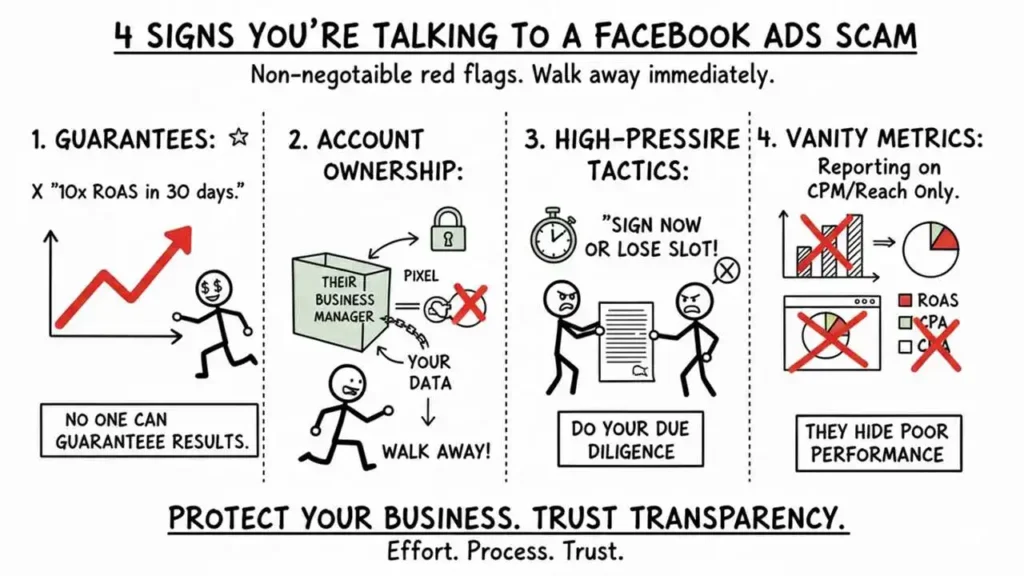
Ready to Stop Vetting and Start Scaling?
Choosing a great Facebook Ads agency comes down to transparency, specialization, and process. The right partner will answer all of these questions confidently before you even have to ask.
We built our Meta/Facebook Ads agency on answering these 7 questions upfront. We lead with specialization, run ads exclusively on your account, and are dedicated to transparent, profit-focused reporting.
FAQs: How to Hide Your Followers on Instagram
1. What is the difference between an Account Manager and a Strategist, and why does it matter?
The distinction is crucial: an Account Manager primarily handles client communication, reporting logistics, scheduling, and billing. The Strategist, however, is the technical expert responsible for campaign structure, budget allocation, creative testing strategy, and making critical, daily optimization decisions within the Ads Manager. When vetting agencies, you need assurance that the expert setting the strategy is accessible to you, not just a junior team member tasked with delivering reports designed by someone else. A top-tier agency ensures direct access to the Strategist.
2. Should I hire an agency that charges a commission based on my ad spend?
Agencies that charge a percentage of ad spend are common and can be a fair model, but it’s best suited for clients with very high, scaling budgets (e.g., spending over $\$50,000$ per month). For smaller budgets, this structure often incentivizes the agency to encourage higher spending, even if performance plateaus, just to increase their fee. For most businesses, especially those just starting to scale, a fixed or flat-fee model offers greater budget predictability and ensures the agency’s primary focus remains on profitability (ROAS/CPA), not just increasing the total dollars spent.
3. How long should I expect to see results before fully committing to a Meta Ads agency?
It typically takes a minimum of 90 days for a new Meta Ads agency to demonstrate clear, sustainable results. The first 30 days are generally dedicated to technical setup, establishing the Conversions API, launching initial tests, and gathering enough data for statistically significant decisions. The subsequent 60 days are when the agency executes the first round of optimization, testing copy, creative, and audiences to find winning combinations. Agencies that promise 10x results in the first 30 days are relying on luck; look for a partner committed to a systematic 90-day process that builds a foundation for long-term scaling.
4. What is the Conversions API (CAPI), and why is it so important for my ad performance?
The Conversions API (CAPI) is a technical setup that allows your server to send data directly to Meta’s server, providing a more reliable and accurate view of conversions compared to the traditional browser-based pixel. With increasing privacy restrictions (like iOS 14 updates) that limit the pixel’s ability to track users, CAPI is non-negotiable for success. Without a properly implemented CAPI, Meta’s algorithm has incomplete data, leading to inaccurate reporting, poor optimization for purchases, and ultimately, significantly worse ad performance and wasted budget.
5. What information should I have ready before the initial call with a prospective agency?
To get the most out of your first call, you should be prepared to share your historical ad spend data, your target Cost Per Acquisition (CPA) or Return on Ad Spend (ROAS) goal, and details about your best-performing product or offer. Having verifiable data about your profit margins and customer lifetime value (LTV) allows the agency to immediately assess if your goals are realistic and whether they can add significant value, moving the conversation past generalities and straight into strategic planning.

